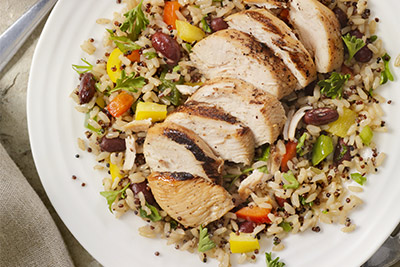 The summertime race season is here, and those fond of training outside are gearing up for a fun and sunny season on the run. But you need to eat healthy to go the distance!
The summertime race season is here, and those fond of training outside are gearing up for a fun and sunny season on the run. But you need to eat healthy to go the distance!
Shorter workouts:
Maybe you’re only in it for the short burn—if you’re exercising for an hour or less at average intensity, you don’t need to do too much in the way of dietary accommodations. Just the usual: plenty of water, and the right mix of nutrients to support your fitness goals.
Example: Take in a simple meal a couple hours before your workout—200 calories, 20 – 30 grams of carbs and 15 – 20 grams of protein is a good goal. Some grilled chicken on whole grain bread will do the trick.
The long haul:
If you’re going to be training for hours or racing for many miles (whether running, biking, climbing, swimming or a mix), research shows you’ll be better off if you load up with the right amount of carbohydrates to prepare. Proper carb-loading includes your increasing carbs the few days before a race and eating 200 – 600 calories of carbs several hours before go-time.
Example: Depending on your size and gender, have at least a cup of brown rice, maybe three, to maximize your glycogen, which equals fuel for endurance. Leave enough time to digest—for the night before, add sweet potatoes. In the morning, bananas work.
What about water?
One thing you don’t want is exercise-induced dehydration. In a race, especially in warm weather, dehydration slows down your motor neurons and it can feel like your moving through wet cement. Racers and athletes shouldn’t wait until they’re thirsty to drink, either. Thirst is a signal that you’re already dehydrating.
Example: One hour of average perspiration can drain you of a couple of pints of fluid, more if you tend to sweat heavy. It’s best to learn the right amount of water for you by training with hydration similar to a race. And watch your urine. It should always be more like the color of lemonade—not apple juice.
What about salt?
High-volume, high-intensity training and competition calls for the right balance of sodium (and other electrolytes) in your cells—especially in hot, humid weather. Electrolytes work to send signals to your muscles and heart. Sweat saps salt from your body, you shouldn’t necessarily avoid salt when in training.
Example: Try a sports drink. You’ll knock out your need for sodium and other electrolytes like the minerals potassium and magnesium. Plus, you’ll get the fluids and extra carbs your body can use when you’re replenishing after every hour of exertion.


